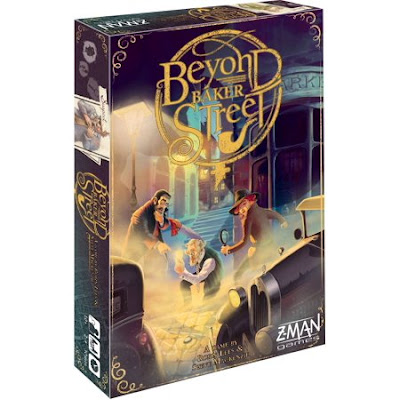MYSTERY BOARD GAMES
I don't know about you, but I love to play board games. And what better games for mystery fans than of course, mystery board games.
Here are just a few available.
🎲🎲🎲🎲🎲
MYSTERY AT THE ABBEY
Mystery of the Abbey is a whodunit deduction game in the spirit of Clue. A monk has been murdered in a medieval French Abbey. Players maneuver their way through the Abbey examining clues and questioning each other to find out who is the culprit.
Monks are of three orders, fat-thin, bald-hatted, bearded-clean shaven. One monk card is hidden, and the rest of the cards are distributed. Turns consist of moving up to two spaces, and then asking a question of any other monks who are present there. (For instance, "how many fat monks do you have?".) Players may either take a "vow of silence" or answer truthfully; they then in turn get to ask the accuser a question. "Mass" occurs every four turns: all players go back to the Sanctuary, an event card is read, and they then pass an ever growing number of cards to their left neighbor. Various rooms have special events or cards associated with them, e.g. in a Cell you get to pick a card from a neighbor, in the Cryptorum you get to pick up a card to take an extra turn later. Unlike Clue you don't automatically win by making a correct Accusation: you get 4 points for getting it right, but you also get 2 points for each correct Declaration of a single trait, and lose points for incorrect declarations and accusations. So, e.g. a person could correctly Declare the culprit but lose the game. Unique Events cards add randomness to each play, and the game begs for House rules to limit the questions.
🎲🎲🎲🎲🎲
SLEUTH
In Sleuth, a classic deduction game from master designer Sid Sackson originally released as part of the 3M Gamete Series, players are searching for a hidden gem, one of 36 gem cards hidden before the start of the game. The remainder of this gem deck – with each card showing 1-3 diamonds, pearls or opals in one of four colors – is distributed evenly among the players, with any remaining cards laid face up. Thus, you and everyone else starts with some information about what's not missing. The simplicity of the rules and the cards belies the complexity of the game. In some cases you see cards, while in others you hear only the number of cards that an opponent holds, making it tough to deduce. Any notation system you devise must be both flexible and reliable, recording negative information as well as positive in order to tick off the possibilities one by one.
In Sleuth, the Dealer shuffles the Gem Deck and removes one card, placing it where no player may accidentally see it. This becomes the Missing Gem. The remaining Gem cards are dealt evenly to each player to form their hands. Players record the information from their private cards on their information sheets. Any remaining Gem cards are placed face up for all players to note and record on their information sheets. Each Gem Card has three elements: Gem (diamond, pearl, or opal), Color (red, yellow, blue, or green), and Type (solitaire, pair, or cluster). Players use Search Cards to discover and record what their opponents hold in their hands Play continues until one player believes they have solved the mystery. They note their guess and check the missing gem. If correct, the player reveals the card and wins the game. If incorrect, the player replaces the missing gem and the game continues. This player is now out of contention but must continue answering any interrogations.
🎲🎲🎲🎲🎲
BEYOND BAKER STREET
Another criminal is on the run, and Sherlock Holmes has a lead! He'll have the culprit behind bars in no time...Unless you beat him at his own game! Holmes isn't the only capable mind in London and it's about time someone noticed!
Beyond Baker Street is a cooperative game where players collaborate to solve a case before the great Sherlock Holmes does. Over the course of the game, you must discover the Suspect, then determine their Motive and Opportunity before they slip from your grasp and into that of Holmes himself! Each player begins the game with a handful of evidence cards that they must match collectively with the leads in front of them. The only problem? The only cards they cant see are their own! As the game progresses, theyll have to rely on their own powers of deduction and clear communication with other players to follow leads and eliminate suspects. Whatever remains, however improbable, must be the truth!
🎲🎲🎲🎲🎲
These are just 3 of of the great
mystery games available.
Keep a check here for future posts on more!
As always, please leave a comment and














No comments:
Post a Comment